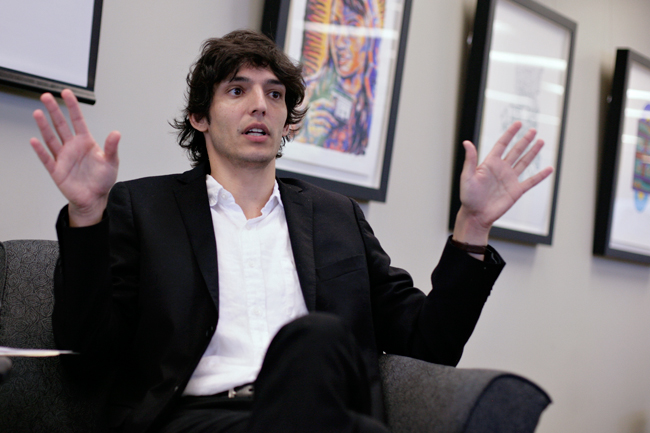Two assistant professors discussed the realities of law enforcement surrounding the border and by-products of the border crisis, rejecting the misconception that the U.S. Border Patrol is militarized, and addressing the growing tension between U.S. law enforcement and volunteer-based Border Patrol groups.
C.J. Alvarez, assistant professor of Mexican American and Latina/o studies, examined the characteristics and power of the U.S. Customs and Border Protection. Sociology assistant professor Harel Shapira talked about the Minuteman Project, a volunteer-based organization that aims to protect communities surrounding the border.
Alvarez said, in comparison to other U.S. law enforcement agencies, the Border Patrol is much different.
“It’s five times bigger than other agencies and 42 percent Hispanic — three times higher than any other agency,” Alvarez said. “People want to read that colloquially — that there’s a solidarity between Mexican-Americans and Mexican nationals. The best way to understand is to look at the demography — it’s heavily Hispanic in border towns.”
Alvarez said he believed there is a misconception that America’s Border Patrol agency is militarized.
“In popular culture, [militarization] is used as a liberal critique, as a way to condemn manpower,” Alvarez said. “Yes, there is a critique to be had there, but the border is militarized on Mexico’s side of border, [where they are] not accountable to civilian court and hold machinery illegal in the U.S. The U.S. is not militarized.”
Shapira said the Border Patrol views the Minuteman Project as another burden along the border.
“There was a kind of professional tension [between the Minuteman Project and Border Patrol] where the Border Patrol would say, ‘We get training and do a set of things,’ but in reality it’s not that hard to be a Border Patrol agent — with all due respect.” Shapira said. “When it came to Border Patrol, the Minutemen were very supportive of Border Patrol. They saw them as blue collar men, just like them. But Border Patrol felt [Minutemen] got in their way.”
According to Alvarez, the collaborative participation between the U.S. and Mexico to eliminate threats on the border has helped him understand the direction of the border crisis.
“What was most surprising to me was what started to emerge: a bilateral police apparatus,” Alvarez said. “Both countries have worked together to determine what constituted as a threat and how to go about that threat. It would be wrong to say there is not a great deal of pain inflicted to regions most vulnerable. What’s been helpful to me is its full bilateral context.”





















